Even when we go to extreme lengths to wash our knitwear with care, it feels like there's no escaping the inevitable pilling and hardening that comes after one wash.
Fashion influencer Jennifer Wang (@wangjenniferr) has explained that it's not you or your ineptitude at laundry. It's the lie that fashion companies sell us about their items' quality.
That sweater dress or sweater might feel soft when you touch it in the store, she says in a viral video, but that doesn't mean it's of high quality.
If your knitwear is made out of synthetic fibers, like acrylic or polyester, then just one wash is enough to make your new piece of clothing crusty and ruined.
These synthetic fabrics are often made out of plastic, so heating them and exposing them to friction in the wash will melt them into larger pieces of plastic. No amount of fabric shaving can fix that kind of damage.
Wang then describes how companies often "gaslight" you when you try to return your clothes to the store, telling you that you didn't wash them properly.
"These companies are literally robbing you in broad daylight by selling you those dresses," she says. "They know what they're doing."
The best fix for this problem, says Wang, is to avoid synthetic fibers altogether and opt instead for wool. Some nylon and polyamide can also be OK.
By investing in better-quality clothes, customers can save money in the long run while avoiding feeding the environmentally harmful machine that is fast fashion.
Producing flimsy garments en masse reduces their life span, with some clothes now lasting no more than seven or eight wears. Those bedraggled items then contribute to the 101 million tons of clothing that end up in landfills each year.
A higher turnover of clothes also means more clothes need to be made, with disastrous consequences for the planet. Pollution from the fashion industry now makes up 10% of the world's air pollution.
YouTubers shared their horror at Wang's revelations and have offered their own tips for more sustainable clothes shopping.
"I am always reading the tags. It's incredible how many products claim that they have wool or they're advertised as wool and you read the tag and it's like 1% wool," one wrote.
"I like to thrift sweaters. Because chances are they've already been washed. And you can see how they held up, before you even bought it," another added.
"It took me ages to get this. Now I save money and only buy high quality pieces. No point in saving money but having to re-purchase over and over again," said another.
Join our free newsletter for easy tips to save more, waste less, and help yourself while helping the planet.









